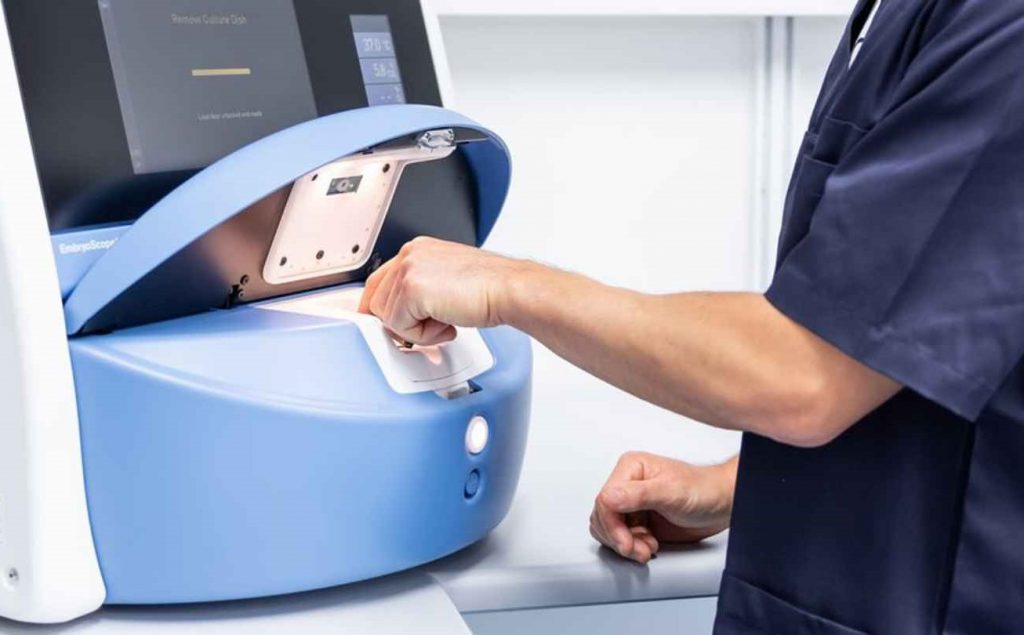Table of Contents
ToggleYou’re not alone if you or a loved one are struggling with infertility. Fortunately, technology has dramatically improved success rates in recent years, and the Embryoscope is one such advancement that has significantly impacted the world of fertility treatments.
As a state-of-the-art incubator used in In Vitro Fertilisation (IVF) treatments, the Embryoscope enables doctors to monitor the development of embryos in real-time through time-lapse imaging, providing high-quality images and enabling informed decision-making. This precision and accuracy have significantly improved IVF success rates, giving hope to couples trying to conceive.
If you’re looking for a fertility centre that utilises the latest technology, look no further than Aastha Fertility Center. Our experienced team of doctors provides a range of infertility treatments, including IVF and ICSI. By choosing Aastha Fertility Center, you can rest assured that you receive the highest quality care and cutting-edge technology to help you achieve your dream of starting a family.
How Does an Embryoscope Work?

The Embryoscope is an advanced incubator that uses time-lapse technology to provide real-time monitoring of embryo development. It eliminates the need to remove embryos for observation, as it has a built-in camera that takes images at regular intervals. These images are then compiled into a time-lapse video, providing doctors with a comprehensive view of the development process.
The Embryoscope also comes with specialised software that analyses the images and provides data on crucial parameters such as cell division rates and morphology. This data enables doctors to make informed decisions about which embryos have the highest chances of success.
Traditional Incubator vs Embryoscope
Compared to traditional incubators, the Embryoscope offers numerous advantages.
- Firstly, it enables continuous monitoring of the embryos without causing any disturbance, thus increasing the likelihood of success.
- Additionally, the time-lapse technology provides doctors with more information about the embryos’ development, facilitating more accurate and informed decision-making.
- Finally, the Embryoscope’s sophisticated software reduces the risk of human error in decision-making, providing objective data on essential parameters.
Overall, the Embryoscope represents a significant breakthrough in fertility treatments, providing doctors and patients with a powerful tool to enhance IVF success rates.
Benefits of Using An Embryoscope
The Embryoscope offers numerous benefits in the field of fertility treatments. Let’s explore some of the most significant embryoscope benefits:
- Continuous Monitoring
The Embryoscope allows for continuous monitoring of embryos without causing any disturbance, which can increase their chances of success.
- Real-Time Monitoring
The Embryoscope utilises time-lapse technology to provide doctors with real-time monitoring of the embryo development process, which can facilitate more accurate and informed decision-making.
- Objective Data
The Embryoscope’s specialised software provides accurate data on essential parameters such as cell division rates and morphology, reducing the risk of human error in decision-making.
- Higher Success Rates
Due to the accurate and continuous monitoring provided by the Embryoscope, doctors can make more informed decisions about which embryos are most viable for transfer, resulting in higher success rates for IVF treatments.
- Improved Embryo Selection
The Embryoscope’s advanced technology enables doctors to make more informed decisions about which embryos to transfer, increasing the likelihood of a successful pregnancy while reducing the risk of multiple births.
Applications of Embryoscope
Embryoscope is one of the significant devices used in IVF treatments to record the time-lapse monitoring of embryo development.
- Time-Lapse Monitoring of Embryo Development
The Embryoscope is an advanced device used in IVF procedures to monitor embryo development through time-lapse imaging. Its applications in reproductive medicine are significant, providing detailed and continuous records of embryo growth that aid in selecting the most viable embryos for implantation. This, in turn, increases the chances of a successful pregnancy.
- Diagnosis Of Embryo Abnormalities
Furthermore, the Embryoscope can diagnose embryo abnormalities, including fragmentation, uneven cell division, and chromosomal abnormalities. This information lets clinicians decide which embryos to implant, improving success rates.
Success Rates
Clinical studies have demonstrated that the Embryoscope time-lapse system can potentially enhance the success rates of IVF procedures. Specifically, a survey by Your IVF Journey on Embryoscope found that using the technology increased the likelihood of a successful pregnancy by 15% compared to traditional IVF methods.
The Embryoscope provides valuable information about the growth and development of embryos without needing them removed from the incubator, which can decrease stress and minimise disturbances to the embryos’ environment, thereby improving success rates. It is essential to note that the Embryoscope is a relatively recent technology, and additional research is necessary to comprehend its benefits and limitations fully.
Limitations of The Technology
Apart from the potential benefits of the Embryoscope time-lapse system in IVF procedures, the technology is also restricted by some limitations, which include –
- Cost
The Embryoscope is generally more expensive than traditional IVF methods, which may make it difficult for some patients to afford.
- Limited Compatibility
The Embryoscope may not be suitable for all types of embryos or fertility treatments. For example, it may not be compatible with frozen embryos or specific genetic testing methods.
- Increased Risk of Error
Continuous monitoring with the Embryoscope can increase the risk of human error, such as misinterpretation of data or misdiagnosis of embryo development.
- Lack of Standardization
Currently, there is no standardised protocol for using the Embryoscope, which may lead to inconsistencies in data and make it challenging to compare results between different clinics and studies.
- Limited Research
As a relatively new technology, there is limited research on the long-term effects of using the Embryoscope on embryo development and pregnancy outcomes.
Cost of Embryoscope
The cost of using an Embryoscope varies depending on the fertility clinic and the specific IVF treatment plan. However, on average, it adds around Rs. 30,000 to Rs. 50,000 to the overall IVF treatment cost.
- Additional Fees
In addition to the cost of using an Embryoscope, additional fees may be involved, such as fees for embryo biopsy, genetic testing, or embryo freezing, which can increase the total cost of IVF treatment.
- Insurance Coverage
Insurance coverage for IVF treatments, including the use of the Embryoscope, is not widespread in India. However, some insurance providers may offer coverage for certain aspects of IVF treatment, such as medications, blood tests, or ultrasound scans. Patients should check with their insurance provider to determine if they cover any part of their IVF treatment costs.
- Discuss with the Fertility Clinic
Patients should discuss the cost and insurance coverage for using an Embryoscope with their fertility clinic to determine the total cost of their IVF treatment and any available options for financing or insurance coverage.
Conclusion
If you’re struggling with fertility and looking to improve your chances of success, the Embryoscope could be a game-changer. With the ability to provide more detailed information about embryo development, reduce stress on embryos, and improve success rates, it’s a technology that’s revolutionising the field of fertility treatments.
At Aastha Fertility Center, we’re committed to providing our patients with the latest and most effective treatments. Our experienced team of fertility specialists can help you understand the benefits of using the Embryoscope and how it can help you achieve your dreams of starting or growing your family.
We offer a range of fertility treatments, including IVF, IUI, ICSI, and more, and also create a personalised treatment plan that meets your unique goals. Contact us today to schedule a consultation and learn more about how we can help you on your fertility journey.





Leave a comment